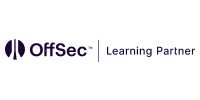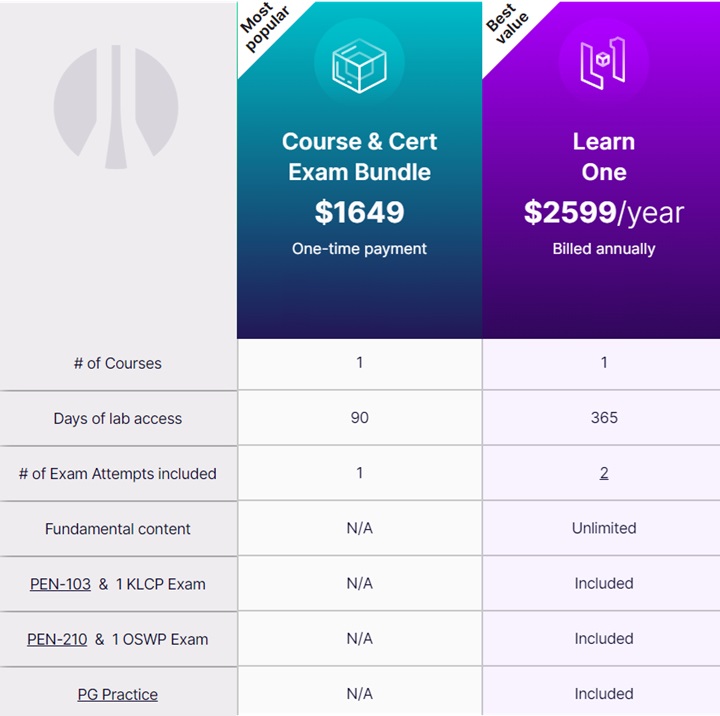Dodatkowe informacje
| Wymagania wstępne | All learners are required to have:
|
|---|---|
| Poziom trudności | |
| Czas trwania | 90 dni |
| Certyfikat | After passing the OSMR exam, candidates receive a title of OffSec macOS Researcher (OSMR). |
| Prowadzący | Authorized OffSec Trainer |
| Informacje dodatkowe | Course is available as the e-learning product, in two subscription's models:
|
Pozostałe szkolenia OffSec | Learn Subscriptions
Najbliższe szkolenia OffSec
-
2025-09-08 | 5 dni | Warszawa / Wirtualna sala
OffSec PEN-200 Penetration Testing with Kali Linux
szkolenie dostępne w wersji stacjonarnej we wskazanej lokalizacji lub w trybie zdalnym, w zależności od preferencji uczestnika: HYBRID -
2025-09-22 | 5 dni | Kraków / Virtual Classroom
OffSec PEN-200 Penetration Testing with Kali Linux
szkolenie dostępne w wersji stacjonarnej we wskazanej lokalizacji lub w trybie zdalnym, w zależności od preferencji uczestnika: HYBRID -
2025-09-22 | 5 dni | Virtual Classroom
OffSec PEN-200 Penetration Testing with Kali Linux
-
2025-09-29 | 5 dni | Warszawa / Wirtualna sala
OffSec PEN-200 Penetration Testing with Kali Linux
szkolenie dostępne w wersji stacjonarnej we wskazanej lokalizacji lub w trybie zdalnym, w zależności od preferencji uczestnika: HYBRID -
2025-10-20 | 5 dni | Kraków / Virtual Classroom
OffSec PEN-200 Penetration Testing with Kali Linux
szkolenie dostępne w wersji stacjonarnej we wskazanej lokalizacji lub w trybie zdalnym, w zależności od preferencji uczestnika: HYBRID -
2025-11-17 | 5 dni | Warszawa / Virtual Classroom
OffSec PEN-200 Penetration Testing with Kali Linux
szkolenie dostępne w wersji stacjonarnej we wskazanej lokalizacji lub w trybie zdalnym, w zależności od preferencji uczestnika: HYBRID -
2025-11-24 | 5 dni | Kraków / Wirtualna sala
OffSec PEN-200 Penetration Testing with Kali Linux
szkolenie dostępne w wersji stacjonarnej we wskazanej lokalizacji lub w trybie zdalnym, w zależności od preferencji uczestnika: HYBRID -
2025-12-01 | 5 dni | Kraków / Virtual Classroom
OffSec PEN-200 Penetration Testing with Kali Linux
szkolenie dostępne w wersji stacjonarnej we wskazanej lokalizacji lub w trybie zdalnym, w zależności od preferencji uczestnika: HYBRID -
2025-12-01 | 5 dni | Warszawa / Wirtualna sala
OffSec PEN-200 Penetration Testing with Kali Linux
szkolenie dostępne w wersji stacjonarnej we wskazanej lokalizacji lub w trybie zdalnym, w zależności od preferencji uczestnika: HYBRID -
2025-12-15 | 5 dni | Kraków / Virtual Classroom
OffSec PEN-200 Penetration Testing with Kali Linux
szkolenie dostępne w wersji stacjonarnej we wskazanej lokalizacji lub w trybie zdalnym, w zależności od preferencji uczestnika: HYBRID



